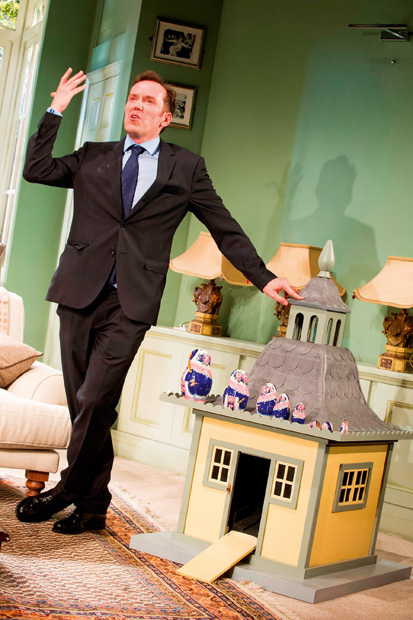It’s taken me a few months to catch up with the political farce The Duck House. Then again, it’s taken The Duck House a few years to catch up with the expenses scandal that it mocks. The story is set in the half-forgotten era of 2009. Robert Houston, a glib New Labour high-flier, is planning to defect to the Conservatives on the eve of the general election. His scheme, which is a little hard to decipher, is to stand for the Tories in his safe Labour seat and to persuade his Labour supporters to join him in a mass conversion to Conservatism.
Having pulled off this piece of electoral magic, he expects to land a plum job in the cabinet as soon as Cameron is returned to power. To make things even more improbable he has a left-wing son, Seb, whose anti-capitalist outlook makes him the ideal candidate to expose Robert’s conspiracy. But the plot obliges the son to take the father’s side, so Seb is drawn as a problem gambler who has thousands of pounds staked on illegal cock fights in the Far East. This hardly squares with the traditional profile of youthful anarchy. But then nothing in this play conforms to political logic. And it doesn’t matter a damn. So overwhelming is one’s desire to see the corruption of parliament exposed to ridicule that the opening absurdities of the script seem entirely forgiveable.
The staging is crisp and nimble. And the gags come thick and fast. Every act of villainy and peculation is duly checked off and satirised: moats, wisteria, hanging baskets, restaurant receipts, glittery loo seats, Gordon’s Brown’s cleaning bill. When Robert learns that his ditzy wife has taken delivery of a duck house he has to caper around the sitting-room in a frantic effort to conceal the poultry refuge from his new Conservative handlers. All this is reliably hilarious.
Also at work is a subplot involving the sexual peccadilloes of Tory grandees. This culminates in a scene where a Eurosceptic MP, stripped to his undies, gets thrashed with a copy of the Lisbon Treaty by a call-girl dressed as Angela Merkel. Is that funny? Just about. But the accretion of detail makes the gag laborious rather than deft or sharp. And it belongs to the decade before last, to the John Major era, when ‘back to basics’ was blown to smithereens by fabricated tales about David Mellor making love in his Chelsea strip. The name of the Tory whipping boy here is Norman. And this sends us scrolling even further back through history to the time of Mrs Thatcher when the cabinet boasted three bearers of that name — Tebbit, Fowler and St John-Stevas. The best jokes are those of most recent provenance. Ukip’s xenophobia is pilloried with a nifty visual gag. Sky-high Nigella gets a name-check when a sugar-dusted cake is splattered over somebody’s clothes. An aside about Chris Huhne receives a massive laugh, which is out of all proportion to the quality of the joke. ‘He gave me a lift once. Drove like a maniac.’
The performances in Terry Johnson’s smooth production are top-notch. Ben Miller brilliantly conveys Robert’s self-serving exasperation. And when he eases off the accelerator he delivers an excellent line in sardonic irony. (There are some great jokes about acupuncture and saving the pandas.) Debbie Chazen does a wonderful turn as a neofascist Russian cleaner with mafia connections. James Musgrave is sweet and charming as the mopey, debt-ridden Seb. And Nancy Carroll, playing Robert’s sexy, stuck-up wife, is so good she deserves equal billing on the posters. As usual, over the party season, I was quizzed by countless drunkards demanding to be pointed towards the best show in the West End. This is it.
At Park, there’s a little-known playlet by Jean-Claude Carrière, who collaborated with both Luis Buñuel and Peter Brook. The narrative seems too simple to be true. Jean, a suave and worldly philanderer, returns to his flat one day to find a beautiful blonde named Susan disporting herself on the chaise-longue. He wants to kick her out. She’s equally determined to stay. The plot then chases itself around in concentric circles. Though the situation sounds formulaic, the script explores the characters and uncovers all kinds of subtle and unexpected depths. Only one mystery harms the show’s authenticity. It never occurs to Jean to bring home a rival conquest and let the girls fight it out between themselves. As it is, the script ends on a smart gag that turns the entire situation on its head. The acting in Kate Fahy’s production is a little over-earnest and doesn’t quite suit the script’s frothy and teasing manner. Otherwise, this is a neat and satisfying festival of surprises.







Comments